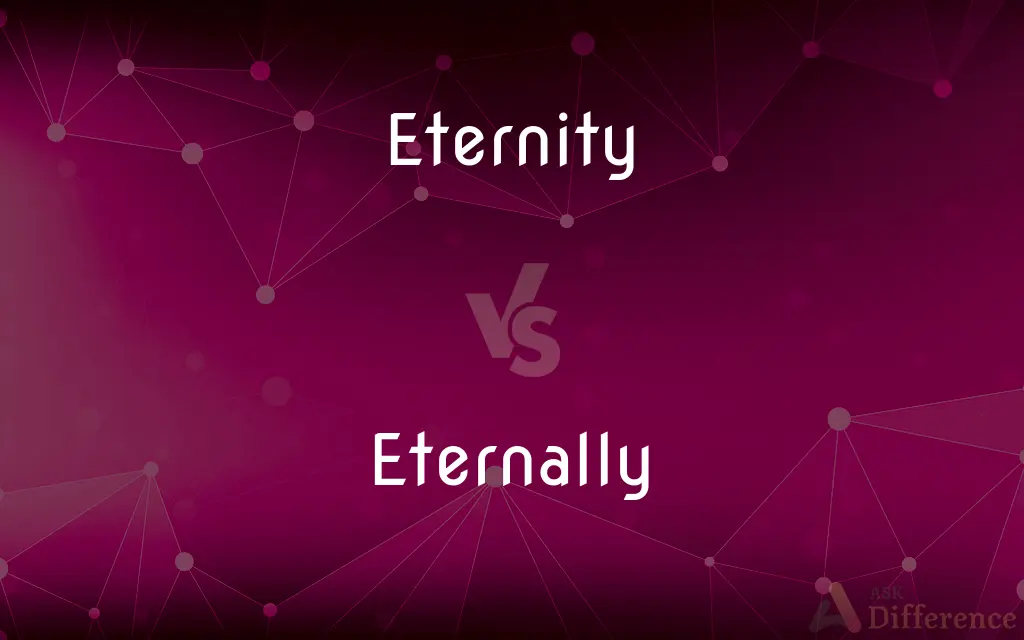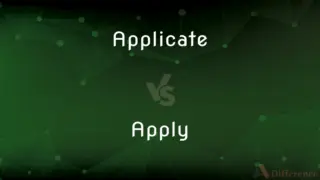Eternity vs. Eternally — What's the Difference?
Edited by Tayyaba Rehman — By Maham Liaqat — Updated on February 26, 2024
Eternity refers to an infinite time duration, while eternally describes something happening without end.

Difference Between Eternity and Eternally
Table of Contents
ADVERTISEMENT
Key Differences
Eternity is a concept that represents timelessness or an unending duration. Eternally, as an adverb, modifies verbs to imply that an action or state continues forever.
Eternity often used in philosophical, religious, and metaphysical discussions to denote life or the universe's infinite nature. Eternally applied in contexts where actions or states extend beyond the temporal limits of the physical world or narrative time frames.
When discussing the concept of time, eternity encapsulates the idea of an unbounded existence, transcending the linear progression of time as humans perceive it. This term conjures images of perpetual continuation, without beginning or end. For instance, describing love as eternally enduring emphasizes its persistence beyond temporal limitations.
Eternity is a noun focusing on the duration aspect, eternally as an adverb emphasizes the nature of how something is experienced or exists over time. This distinction highlights their roles in language: one as a subject of discussion, the other qualifying descriptions of actions or states. Eternally, in contrast, is used to describe the manner in which something exists or acts within the framework of eternity.
Comparison Chart
Part of Speech
Noun
Adverb
ADVERTISEMENT
Definition
Infinite duration, without beginning or end
Happening without end, perpetually
Usage Context
Philosophical, religious, metaphysical
Descriptive, often in literature or rhetoric
Implies
A state of being outside time
The manner in which something occurs over time
Examples
Concept of afterlife, universe's infinite nature
Love enduring forever, perpetual motion
Compare with Definitions
Eternity
A fundamental idea in metaphysical discussions.
Eternity is a key concept in debates about the universe's nature.
Eternally
Happening without ever ending.
The stars shine eternally, unaffected by our earthly troubles.
Eternity
Often associated with life.
Many religions offer different interpretations of eternity in their doctrines.
Eternally
Without cessation or pause.
The river flows eternally, carving its path through the landscape.
Eternity
The state or quality of having no end.
Eternity is a daunting concept, reflecting an unending existence.
Eternally
Transcending the bounds of time.
This work of art holds eternally relevant themes.
Eternity
Beyond the temporal constraints of the physical world.
Eternity represents a realm where time no longer dictates existence.
Eternally
In a manner that continues forever.
Their love was eternally preserved in the pages of history.
Eternity
Infinite or unending time
This state of affairs has lasted for all eternity
Their love was sealed for eternity
Eternally
In a never-ending manner.
They vowed to remain eternally faithful to each other.
Eternity
Eternity, in common parlance, means infinite time that never ends (or the quality, condition or fact of being eternal). Classical philosophy, however, defines eternity as what exists outside time - as in describing supernatural beings and forces, whereas sempiternity corresponds to the infinitely temporal, non-metaphoric definitions, as recited in requiem prayers for the dead.
Eternally
In a way that continues or lasts forever; permanently
His eternally optimistic attitude
We must be eternally vigilant
Eternity
Time without beginning or end; infinite time.
Eternally
Used to emphasize expressions of admiration, gratitude, etc.
I shall be eternally grateful
Eternity
Time without end
Eternally
Being without beginning or end
Belief in an eternal creator.
Eternity
A seemingly endless time interval (waiting)
Eternally
Seemingly endless; interminable
Eternal waiting at the airport.
Eternity
The state of lasting forever.
The concept of eternity fascinates both philosophers and theologians.
Eternally
Something timeless, uninterrupted, or endless
"Shall we speak of universals and eternals?" (Cynthia Ozick).
Eternally
For eternity; forever.
I shall be eternally grateful for your assistance.
Common Curiosities
How is eternally used in literature?
Eternally is used to emphasize the perpetual nature of actions, states, or qualities, often adding depth to narrative themes or characterizations.
Can humans experience eternity?
Eternity is beyond human experience of time; however, many religions and philosophical traditions suggest the soul or consciousness may encounter it.
What is the primary difference between eternity and eternally?
Eternity is a noun that denotes an infinite duration, while eternally is an adverb describing how something occurs perpetually.
Can something be eternally temporary?
Conceptually, this is contradictory, as eternally implies without end, while temporary suggests a limited duration.
Can eternity have a beginning?
Philosophically, eternity is considered to have no beginning or end, representing a state outside the conventional understanding of time.
Why is the concept of eternity important?
It challenges human understanding of time and existence, offering perspectives on life, the afterlife, and the universe's nature.
How do different cultures perceive eternity?
Perceptions of eternity vary widely, reflecting diverse philosophical, religious, and cultural understandings of time and existence.
Can eternally be used in everyday language?
Yes, eternally can be used to express exaggeration or deep emotion about something's lasting nature in casual conversation.
How do eternity and eternally relate to the concept of time?
Both challenge the linear, finite conception of time, suggesting a state or manner of existence beyond its bounds.
Is eternity a concept found only in religion?
While prevalent in religious contexts, the concept of eternity is also explored in philosophy, metaphysics, and science.
Is the concept of eternity comforting or frightening?
This varies by individual perspective, influenced by personal beliefs, existential views, and cultural or religious backgrounds.
How does eternally modify the meaning of a verb?
Eternally adds a sense of perpetual continuation or endlessness to the action or state described by the verb.
Can the use of eternally in literature change its meaning?
Literary context can imbue eternally with nuanced meanings, reflecting the author's thematic intentions or characters' emotions.
What role does eternity play in discussions about the afterlife?
Eternity is central to many religious and philosophical discussions about the afterlife, often representing a state of eternal existence or bliss.
Is there a scientific basis for eternity?
Science explores concepts like the universe's age and potential infinity, but eternity as a philosophical or metaphysical concept remains beyond empirical science.
Share Your Discovery

Previous Comparison
Football vs. Volleyball
Next Comparison
Applicate vs. ApplyAuthor Spotlight
Written by
Maham LiaqatEdited by
Tayyaba RehmanTayyaba Rehman is a distinguished writer, currently serving as a primary contributor to askdifference.com. As a researcher in semantics and etymology, Tayyaba's passion for the complexity of languages and their distinctions has found a perfect home on the platform. Tayyaba delves into the intricacies of language, distinguishing between commonly confused words and phrases, thereby providing clarity for readers worldwide.















































